
Our Ocean is a Collective Responsibility
June 10th, 2018
Is the world going through a “sea change” – or are these swirling tides heading nowhere?
With the G7 (or as I prefer to call it, the G6 plus 1) officially over, and World Environment Day and World Oceans Day passing us in quick succession, it might be a good idea to take a breath and look back at the many and varied discussions surrounding these events. I never, ever feel the desire to talk about the despicable Trump and his virulent tweeting against a faithful ally of his country. However, I have been looking at what others have been saying about our oceans, plastic pollution, and our island predicament.
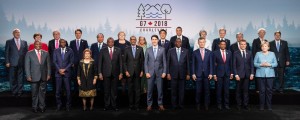
What G7 Canada calls the “G7 family photo,” including outreach leaders, at Charlevoix, Canada after the meeting. One family member is missing! (Photo: G7 Canada)
I just read a wonderful tweet from the President of the Marshall Islands, way over in the Pacific, Dr. Hilda C. Heine. She spoke at today’s special session on #OurOcean at the G7 and participated in the meeting’s Outreach Session, which also included Jamaica and 14 other specially invited countries and organizations. Dr. Heine noted:
My country comprises mostly oceans. And as an islander, as a spouse, as a mother, and as a grandmother, I am here to bear witness to what is happening to our beautiful, peaceful island nation.
“Our Ocean” was on the agenda for this group. That phrase is significant. The ocean brings all nations together. We share our sea space – most of the earth’s surface – and it connects us all. How can we care for it better? How can oceans and maritime resources help to support local and national economies?
Plastic pollution was, of course, to be discussed; every country in the world contributes to and suffers from this insidious poisoning of our environment. The topic of a very well attended World Environment Day event in Kingston – the business side of waste – encompassed this problem. It was organized by 360 Recycle Jamaica with support from Wisynco Eco and others. Senator Matthew Samuda pointed out that the current political administration has gone “from conversation to policy” on waste management in just two years. Well, give or take a few. On World Oceans Day, Minister Without Portfolio in the Ministry of Economic Growth and Job Creation Daryl Vaz announced a plastic bottle deposit scheme. A working group on single-use plastic has also just concluded its deliberations, so I am hoping for another announcement soon!
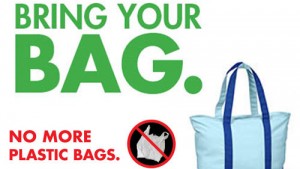
A pilot whale was found dead in Thailand last week with eighty – yes, EIGHTY – plastic bags in its stomach, amongst other plastics.
One should be aware, though, of all the actions that are being taken worldwide (including in the Caribbean). Almost daily, there is a new announcement. Bangladesh (one of the outreach countries) banned plastic bags as far back as 2002, after major floods; doesn’t this sound familiar? Last year, Zimbabwe banned a type of styrofoam used for food containers, that takes up to one million years to decompose. This year, Canada banned microbeads.
The proof of the pudding is always in the eating, though. Let us see if we get results.
Other topics for the “outreach leaders” at the G7 included strengthening the knowledge and science surrounding maritime matters. There’s a lot to learn, and a lot to teach. There is so much scientists have not discovered yet, hidden beneath the waves. In the Caribbean, scientists have found a new “twilight zone” in deep coral reefs off the coast of Curacao – just this year. It includes previously unknown species of marine creatures.
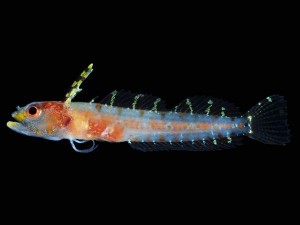
One of the new fish species discovered this year in the rariphotic “twilight zone” in the Caribbean, Haptoclinus dropi. (Photo: Carole Baldwin, Smithsonian)
Then there is the desperate need to build resilient coasts and coastal communities; this is not only an issue for those who live in places like Portland Cottage and Rocky Point in Clarendon, where the ocean encroaches on homes and there is a danger of salt water creeping into the freshwater table. I suspect that sea level rise is not taken as seriously in the region as other symptoms of climate change, however. It is not just a question of “building a wall.” If only life were so simple.
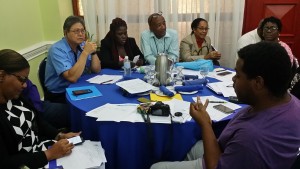
Dr. Andre Kong of the Fisheries Division (2nd left) at a recent FAO discussion. He is very worried about illegal, unreported and unregulated fishing in Jamaica’s coastal waters. (My photo)
I believe that we will be hearing a great deal more about our fisheries in coming years, also. At a recent workshop organized by the Food and Agriculture Organisation in Kingston, head of the Fisheries Division Dr. André Kong spoke with a sense of urgency about “IUU” – illegal, unreported and unregulated fishing. We cannot continue to reap the harvest of the sea so carelessly, at will, without putting anything back. It is like cutting down trees and never replanting. Marine protected areas and fish sanctuaries can give the seas a chance to recover.
Our Ocean is a collective sharing. It’s also a collective responsibility. Is there a glimmering of awareness among citizens, in Jamaica and beyond? Perhaps. Actions always speak louder than words, so let us all find ways to protect and care for our seas and all they contain.
After all, our health – our very survival – depends on it. If our ocean gets sick, so do we.
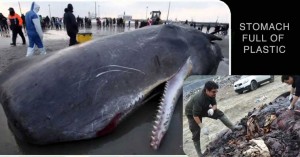
Killed by plastic: a young sperm whale that died on a beach in the Netherlands in 2013, its stomach full of dozens of plastic bags. (Photo: davidwolfe.com)
Tags: 360 Recycle Jamaica, Andre Kong, Bangladesh, Canada, Caribbean, Charlevoix, Climate Change, coastal communities, Curaçao, Daryl Vaz, Donald Trump, fisheries, Fisheries Division, Food and Agriculture Organisation, freshwater, G7, Hilda Heine, illegal unreported and unregulated fishing, Kingston, marine environment, Marine Protected Areas, Marshall Islands, Ministry of Economic Growth and Job Creation, Pacific, plastic bags, plastic bottles, plastic pollution, Portland Cottage, Rocky Point, sea level rise, Senator Matthew Samuda, single use plastic, Small Island Developing States, sustainable development, sustainable fisheries, Wisynco, World Environment Day, World Oceans Day, Zimbabwe
The Gleaner reserves the right not to publish comments that may be deemed libelous, derogatory or indecent.
To respond to The Gleaner please use the feedback form.
- We Are the Zoomers
- Living Online with Humans and Birds: NAOC 2020
- Human Trafficking and the Problem of Public Education
- Down Memory Lane
- Are We Ready to Recover from COVID-19?
- Road Safety Matters: Is Your Vehicle Safe?
- Sexual Harassment, Me Too, and the Minister’s Disturbing Giggle
- The Vulnerable Senior Citizens, Private Care Homes and COVID-19
- A Muddle Over Masks
- Here is Something Life-Saving You Can Do: Give Blood!


